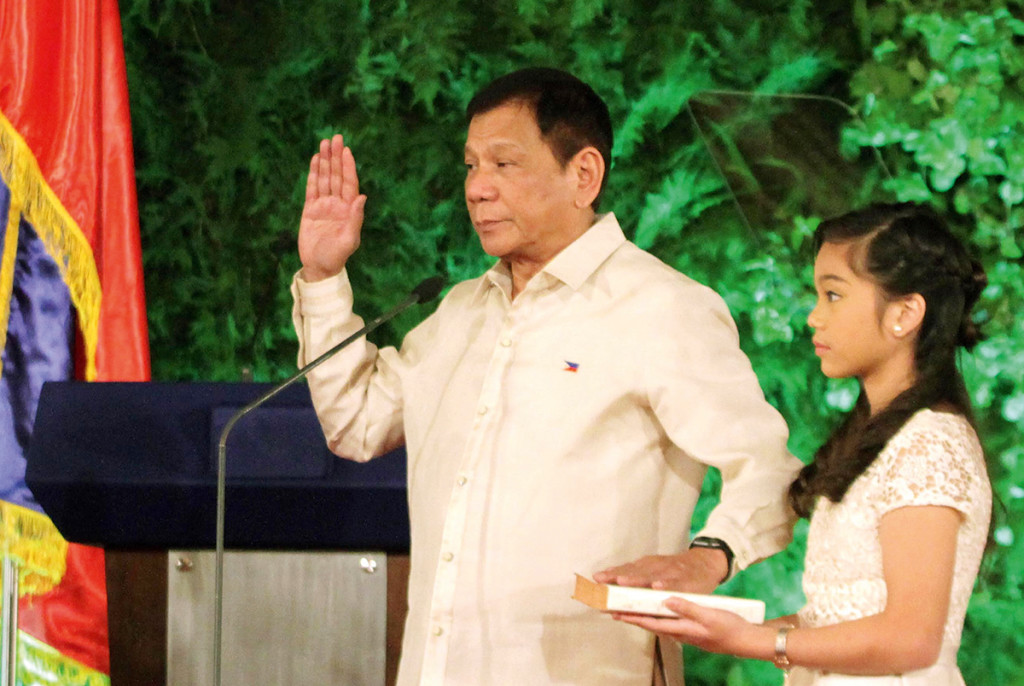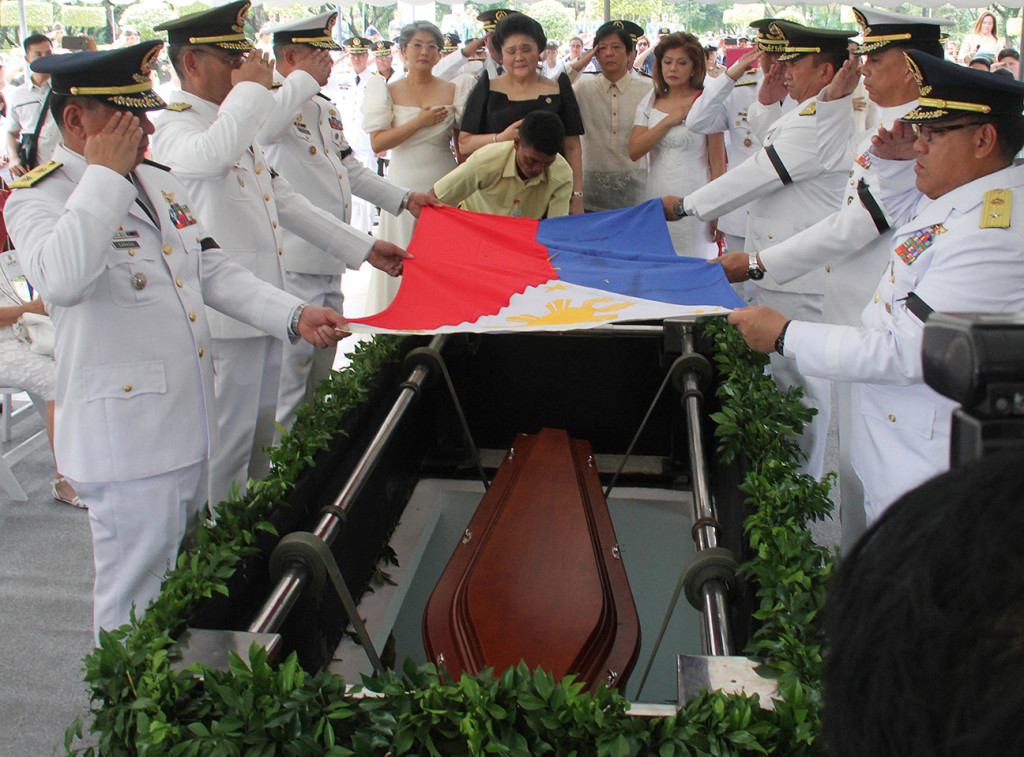Before we welcome a fresh new year, let’s take a look back at the year’s most talked about news stories.
By MARICHU A. VILLANUEVA
The year 2016 was the year of dramatic, if not historic, change. From the array of such drastic changes, we picked the top 10 stories that hogged the headlines in the Philippines and around the globe.

1. The Hague Ruling
On July 12, the Hague Arbitral ruling was handed down after the Philippines’ claims were formally filed in 2013. The Philippines invoked the 200-mile exclusive economic zone (EEZ) under the United Nations Convention on the Law of the Sea (UNCLOS), to which the country is among the signatory states. The Hague Arbitral Tribunal set aside the nine-dash based on historical claims of sovereignty invoked by Beijing over the entire stretch of the South China Sea.
Following this decision, Philippine-China relations took an icier turn, especially after President Benigno Aquino III repeatedly declined Beijing’s pleas of settling the overlapping maritime territorial claims between the two countries through bilateral negotiations. But while making such pleas, China continued with its construction of military-type facilities at the Mischief Reef and other disputed areas in the Spratly Islands in the South China Sea.
As it had declared at the outset after it was filed in 2013, China refused to honor the Arbitral ruling that recognized our country’s claims around the disputed territories in the West Philippine Sea, as we call it. China, like the United States, is a signatory to the UNCLOS, though both nations have not ratified it.
The icebreaker in the Philippine-China relations came only with the May 9 election of President Rodrigo Roa Duterte. Barely a few weeks into his presidency, he convened for the first time the National Security Council (NSC) to advise him on the next steps of the Philippine government following The Hague ruling. Four former presidents, namely, Fidel Ramos, Joseph Estrada, Gloria Macapagal-Arroyo and Noynoy Aquino, were invited to the NSC meeting as ex-officio members of the highest advisory body that President Duterte immediately convened for this matter.
President Duterte later made a state visit to Beijing from Oct. 18 to 21, after which he and Chinese President Xi Jinping came to a mutual understanding to resolve the territorial maritime dispute peacefully without further reclamations and other acts that could otherwise precipitate conflict. President Duterte brought home a windfall from his Beijing state visit, including a number of government-to-government and private sector investments into the Philippines. As of this writing, Beijing has not harassed Filipino fishermen at the rich fishing grounds in the Scarborough Shoal.
2. Duterte wins
Despite being foul-mouthed and making highly controversial statements during the campaign, 72-year-old presidential candidate Rodrigo Duterte emerged unscathed from his public cussing of Pope Francis and making a joke at the expense of a female Australian missionary (who was gang-raped by prisoners during the Davao penal colony riot while he was still mayor).
Duterte won with 16 million votes during the May 9 presidential elections. With this margin, he beat Aquino-anointed candidate, former Interior Secretary Mar Roxas, who finished second in the presidential race. Although backed by Aquino administration’s Liberal Party (LP) juggernaut, Roxas failed to stop the last minute surge of Mayor Duterte as PDP-Laban’s presidential timber.
Neophyte Sen. Grace Poe, Vice President Jejomar Binay and the late Sen. Miriam Defensor-Santiago placed third, fourth and fifth respectively in the presidential race. Afflicted with stage four lung cancer, 71-year-old Santiago passed away a few months after the elections on Sept. 29.
Another fledgling lawmaker, Camarines Sur Rep. Leni Robredo, won the tight contest in the vice presidential elections over arch rival, outgoing Sen. Ferdinand “Bongbong” Marcos Jr. As the running mate of Roxas, the LP-backed candidacy of Robredo pulled her surprise win over five senior politicians, including Marcos (running mate of Santiago); Francis “Chiz” Escudero (Poe); Alan Peter Cayetano (Duterte); Antonio Trillanes IV (Poe); and Gregorio Honasan (Binay).
(President Rodrigo Duterte takes the oath as his daughter Veronica holds the Bible during his inauguration in Malacañan Palace last June 30 | The News and Information Bureau, Malacañan Palace)
3. Word war with the UN, US, EU
Across the globe, world leaders who had criticized President Duterte were not spared from his scathing remarks. At one point of exasperation over foreign pundits, he threatened to disengage the Philippines from its membership with the UN.
This occurred after UN Secretary-General Ban Ki-moon called the attention of the Duterte administration to the possible human rights violations carried out by police authorities in the wanton killing of drug suspects. Taking note of these developments in the Philippines, the UN Special Rapporteur also chimed in with their concerns regarding basic human rights and equal protection under the law.
The rising notoriety of President Duterte’s anti-drug war reached a crescendo on the eve of the Association of South East Asian Nations (ASEAN) Leaders’ summit in Laos on Sept. 6. In a pre-departure press conference at the Davao International Airport, President Duterte fumed at a question about how he would respond to human rights accusations against his administration in his scheduled talks with US President Barack Obama at the sideline of the ASEAN Regional Forum meeting that also took place in Laos after the summit.
A livid President Duterte responded by saying that he should not be treated in a manner unfit for the leader of an equally sovereign country and punctuated his warning with his favorite cusswords. His expletive was loosely translated by the White House advisers as telling President Obama that he is a “son of a whore.” As a result, the talks between the two presidents were cancelled.
President Duterte stressed that the Philippines will be merely pursuing independent foreign policy, which is in the country’s 1987 Constitution, under his watch for the next six years. In line with this, the President justified the Philippine pivot to China and Russia as being better alternatives because these two nations do not meddle as much in the country’s internal affairs.
The European Union (EU) likewise incurred the ire of President Duterte. He chided the bloc for not being able to agree even amongst themselves over the issue of whether or not to accept refugees from Syria and other strife-torn nations coming to their continent, and yet they castigate him for alleged human rights abuses in the Philippines.
4. Extra-judicial killings
After declaring an all-out war against illegal drugs before he assumed office at Malacañan Palace, slain drug suspects started literally piling up on the streets; the incidence of their deaths showed signs of summary execution. Newly appointed Philippine National Police (PNP) director-general Ronaldo “Bato” dela Rosa rose to popularity as he carried out the anti-drug campaign for President Duterte.
But President Duterte’s attitude towards extra-judicial killings (EJKs) also began to hound his new administration. Local human rights groups, as well as those from the international community, started taking notice of the sheer number of drug suspects being killed each day across the country.
President Duterte pointed to drug lords and their suspected cohorts among the scalawag policemen as the ones likely behind these execution-style slayings; it was an apparent cleansing and purging of potential whistleblowers. Nonetheless, the impunity continued as more suspects were slain, wrapped like mummies and bore placards identifying them with the words “Drug pusher ako, wag tularan.” Apparently, the perpetrators were cashing in on the seemingly tacit go-signal from the President who kept giving instructions in his extemporaneous speeches “to kill” drug lords and their cohorts.
President Duterte came up with his so-called “narco” list of personalities that included police generals, mayors, governors, congressmen and barangay officials allegedly involved in the multi-billion peso shabu trade in various parts of the country. In his latest inventory of the “narco” list, the President had come up with 5,000 names of these drug personalities.
The latest figures released by the PNP show that more than 4,000 drug suspects have been killed since President Duterte took over. This number included the killing of two mayors who reportedly shot it out with policemen. One of the slain was Albuera Mayor Rolando Espinosa, who was killed on Nov. 5 while in police detention in a local jail in Leyte. Out of fear of being killed, mayor Espinosa earlier surrendered peacefully to no less than the PNP chief at Camp Crame in Quezon City. His son, Kerwin, who was also included in the “narco” list, fled to the United Arab Emirates, where he was arrested several weeks later.
5. De Lima, Narco-politics
The rising extrajudicial killing incidents led to Senate public hearings initiated by resolutions filed by Sen. Leila de Lima and Sen. Antonio Trillanes. The legislative inquiry into the EJKs went as far back as the mayoral terms of President Duterte in Davao City.
A whistleblower by the name of Edgar Matobato came forward on Oct. 7before the Senate Committee on Justice and Human Rights to confess that he was a hitman for the dreaded Davao Death Squad (DDS). Then chairperson of the Commission on Human Rights (CHR), de Lima conducted an investigation of the DDS being behind the EJKs in Davao City under the helm of then mayor Duterte.
Matobato admitted under oath as having killed at least 50 people in Davao City at the behest of then Mayor Duterte and/or his son, now Vice Mayor Paolo. Placed under the Witness Protection Program (WPP), Matobato is currently detained for his previous murder case in Davao City.
Ironically, the legislative inquiries conducted by the Senate and Congress also pinned down de Lima, whom President Duterte blamed for allegedly “opening the portals” to narco-politics in the Philippines. President Duterte pointed to de Lima who, as former justice secretary, allegedly allowed the lucrative illegal drugs trade to continue right inside the New Bilibid Prison (NBP) in Muntinlupa City.
One of the high-profile NBP inmates, JayBee Sebastian, was even featured in an international TV program that exposed the weakness of the country’s penal system. Sentenced to life imprisonment, JayBee was identified as one of the leaders of convicted kidnappers, murderers, rapists and drug lords enjoying a life of luxury right inside the maximum security compound of the state penitentiary.
After being nearly killed in a riot at the NBP, he confessed before a House hearing that he indeed provided drug money to fund the senatorial campaign of de Lima.
JayBee Sebastian testified before the House hearing that the drug trade indeed flourished at the NBP during her watch at the DOJ through Ronnie Dayan, de Lima’s lover as well as her former driver and security escort. At least P8 million of drug trade revenues allegedly found their way into de Lima’s undeclared source of senatorial campaign funds.
After sidestepping questions over her true relations with Dayan, de Lima confirmed that she and her former driver and security escort were indeed lovers at one time. On a national TV talk show program, de Lima insisted that there was nothing wrong with having an affair with men as her marriage had already been annulled.
6. Trump stuns
The American people voted for billionaire businessman Donald Trump to be their 45th President. The Republican candidate bested Democratic candidate, former US First Lady and later Secretary of State Hillary Clinton. The US elections on Nov. 8 set the stage for a Republican comeback at the White House when outgoing President Obama officially turns over the Oval Office to president-elect Trump in Jan. 2017.
During the US presidential campaign, Trump’s anti-immigration speeches mentioned Filipinos among the foreign nationals who would face entry restrictions into the US if he was elected.
Acknowledging Trump’s notoriety for his temper and cussing in public, President Duterte said he is no match for the incoming US President. President Duterte, however, looks forward to the incoming Trump administration amidst strained relations with the outgoing Obama administration.
7. Pacquiao wins
On Nov. 6, former world boxing champion and now Sen. Emmanuel “Manny” Pacquaio returned to the ring in Las Vegas and won by a unanimous decision over much younger champion Jessie Vargas. Sen. Pacquiao reclaimed the WBO welterweight champion title after he overpowered Vargas during the 12-round match highlighted by a near knockout of his opponent.
Being a new member of the Upper Chamber of the 17th Congress — he was among the 12 winners of the May 9 senatorial elections — Sen. Pacquiao broke out from a short retirement from professional boxing and started his training for another crack at the WBO belt. He made sure that he wouldn’t become one of the top absentee lawmakers again when he fought several boxing matches while he was still a Congressman from Saranggani.
After his victory over Vargas, the 37-year-old boxer-senator has indicated his interest in fighting anew his arch rival, Floyd Mayweather, in a rematch.
8. Marcos’ secret burial
“Like a thief in the night,” the remains of President Ferdinand Marcos were transferred from Batac, Ilocos Norte to the Libingan ng mga Bayani (LNMB) in Taguig City on Nov. 18. It happened a few months after President Duterte met with the Marcos family after the elections.
Consistent with his campaign stance in favor of the Marcos burial at the LNMB, President Duterte posed no objection to carry out the transfer of the remains from the family mausoleum in Batac to the LNMB for as long as there were no legal impediments in doing so. President Duterte admitted his close connection with the late President Marcos. The father of President Duterte served in the Marcos Cabinet during the martial law regime as general services minister.
President Duterte also admitted that he felt indebted to Ilocos Norte Gov. Imee Marcos, the eldest daughter of the late dictator, for being the among few local government officials who supported his candidacy in the last presidential elections.
The anti-Marcos petitioners ultimately lost their case after the Supreme Court voted 9-5 in favor of the planned burial at the LNMB. SC Chief Justice Ma. Lourdes Sereno was among the five justices who voted against the Marcos burial at the LNMB. But while the petitioners had 15 days to appeal the SC ruling, the Marcoses quietly conducted military burial rites with the help of the Armed Forces of the Philippines (AFP), while the PNP provided the security against projected anti-Marcos rallies.
Lagman and other anti-Marcos petitioners sued the Marcoses, the AFP and the PNP for surreptitiously carrying out the burial. As of this writing, the SC has not acted on the appeals of the anti-Marcos petitioners.
(Soldiers prepare to fold the flag over the casket of the late dictator Ferdinand Marcos during his burial at the Libingan ng mga Bayani in Taguig City last Nov.18 | Office of the Army Chief Public Affairs Headquarters Philippine Army)
9. Death of Cuba’s Fidel Castro
The iconic leader of Marxist-Leninist revolution in Cuba, Fidel Castro, died on Nov. 27 at the age of 90. His younger brother, Raul, who is currently Cuba’s incumbent president, officially announced his demise after a long struggle with cancer.
The late Castro first served Cuba as its prime minister from 1959 to 1976 and later as president from 1976 to 2006.
He survived several assassination attempts, some of which he blamed on the US government in retaliation to his pro-Soviet government. Saying that he was no communist but a socialist, President Duterte condoled with the people of Cuba who would miss their former revolutionary leader.
10. Climate change pact goes into force
The Climate Change Agreement inked in Paris last year went into force on Nov. 4 without the Philippines ratifying it. The Philippines was one of the 120 signatory states to this UN Framework for Climate Change Agreement. After he initially opposed it, President Duterte later recanted on his refusal to endorse to the Senate its ratification. The global warming phenomenon is one of the identified causes of severe climate change that gives rise to unpredictable natural calamities, from earthquake to tsunamis and deadly storm surges and cyclones.
The President disclosed that he changed his mind because he was outvoted by his Cabinet, which included Department of Environment and Natural Resources (DENR) secretary Gina Lopez, who recommended the accession to the Climate Change pact. Once the Philippines ratifies this, it will be qualified to avail of assistance from the $200 million fund set aside for countries vulnerable to climate change-driven disasters. Citing the case of super typhoon Yolanda that killed more than 3,000 people in Leyte and Samar three years ago, President Duterte challenged climate change advocates to convince him that the Philippines will benefit from joining this pact.
Fortunately, Mother Nature was kinder to the Philippines this year with no major natural or man-made calamity as of this writing.
Incidentally, President Duterte forgot to submit the nomination of Lopez as DENR secretary for confirmation by the Congressional Commission on Appointments (CA). She, along with 14 other Duterte Cabinet officials, was earlier by-passed by the CA, which adjourns together with Congress sessions. It fueled rumors of Lopez being eased out this early.
Changes in the Duterte Cabinet may come sooner than expected after the President warned them against any corruption or non-performance in office. The President’s warning came as he prepares to sign into law the 2017 budget: “Use it (budget) or lose it (Cabinet post).”







